
|
Astronomy Picture Of the Day (APOD)
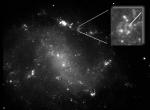 ESO 184 G82: and the Supernova Gamma Ray Burst Connection
ESO 184 G82: and the Supernova Gamma Ray Burst Connection
28.02.2002
Modern astronomers keep a long list of things that go bump in the night. Near the top are supernovae - the death explosions of massive stars, and gamma-ray bursts - the most powerful explosions seen across the Universe.
 A Cloud Shadow Sunrise
A Cloud Shadow Sunrise
27.02.2002
What could cause a ray of dark? Such a ray was caught in spectacular fashion above the Florida Everglades two years ago. The cause is something surprisingly familiar: a shadow. The gold-tinged cloud near the horizon blocks sunlight from reflecting off air behind the cloud, making that column of air appear unusually dark.
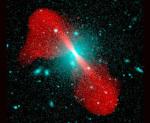 Jets from Radio Galaxy 3C296
Jets from Radio Galaxy 3C296
26.02.2002
Jets of streaming plasma expelled by the central black hole of a massive elliptical galaxy likely light up this composite image of 3C296. The jets emanating from NGC 5532 and are nearly a million light years long. Exactly how the central black hole expels the infalling matter is still unknown.
 Crescent Europa
Crescent Europa
25.02.2002
Although the phase of this moon might appear familiar, the moon itself might not. In fact, this crescent shows part of Jupiter's moon Europa. The passing robot spacecraft Voyager 2 captured this image in 1979.
 Isaac Newton Explains the Solar System
Isaac Newton Explains the Solar System
24.02.2002
Sir Isaac Newton changed the world. Born in 1643, Newton was only an above-average student. But he went home from Cambridge one summer in 1665, thought a lot about the physical nature of the world, and came back two years later with a revolutionary understanding of mathematics, gravitation, and optics.
 Shocked by Supernova 1987A
Shocked by Supernova 1987A
23.02.2002
Fifteen years ago today, the brightest supernova of modern times was sighted. Over time, astronomers have watched and waited for the expanding debris from this tremendous stellar explosion to crash into previously expelled material.
 Saturn at the Lunar Limb
Saturn at the Lunar Limb
22.02.2002
Gliding through the sky on Wednesday evening, February 20th, a first quarter Moon seemed to run over bright planet Saturn as viewed from much of North America. In this sharp sequence of telescopic digital...
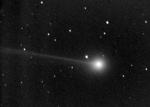 Comet Ikeya Zhang
Comet Ikeya Zhang
21.02.2002
Comet Ikeya-Zhang is presently heading north in planet Earth's sky, framed by stars of the constellation Cetus. The comet was discovered as a faint, telescopic object near the western horizon on the evening...
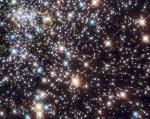 Oddities of Star Cluster NGC 6397
Oddities of Star Cluster NGC 6397
20.02.2002
One of these stars is blinking. This star, a member of globular cluster NGC 6397, is noteworthy not just because it blinks, but because it blinks so fast and because its companion star is so atypical.
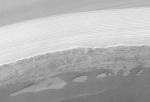 Water Ice Imaged in Martian Polar Cap
Water Ice Imaged in Martian Polar Cap
19.02.2002
Does water exist today on Mars? Yes, although the only place on Mars known to have water is the North Polar Cap, and that water is frozen. Views of this potentially life-enabling water-ice are usually obscured -- in the winter by darkness and in the summer by clouds.
|
January February March April May June July August September October November December |
|||||||||||||||||||||||||||||||||||||||||||||||||